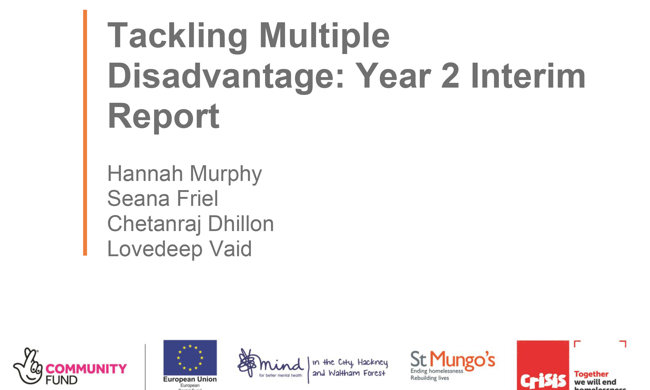TMD Interim Report Year 2
29.05.2019
This interim report is the second of three reports for the evaluation of the Tackling Multiple Disadvantage (TMD) project. The TMD project is in live delivery between April 2017 until December 2019. The project provides personalised coaching support and tailored employability provision to support homeless people with multiple and complex needs into training or employment. TMD is a Building Better Opportunities project funded by the Big Lottery Fund and the European Social Fund. It is being delivered across 17 London boroughs by a partnership of specialist homelessness or mental health organisations. This interim report presents findings from research conducted with TMD participants and coaches and quantitative analysis of project performance.
Project performance
The TMD project has currently recruited 253 participants, which is equivalent to 57% of the profiled target. The project has had mixed success in reaching demographic targets, with women and economically inactive participants currently underrepresented in support. The TMD project is currently achieving an employment outcome rate of 18%. While this is lower than the ambitious 28% target, it is in line with outcomes achieved by comparable support. Training and job search outcomes will also be reported in the final report but are not currently being recorded whilst an employment result remains possible. The key reasons for project underperformance have related to operational challenges. The project has seen unusually high levels of staff turnover with nine staff from four partners leaving the project. This was attributed to onerous administrative requirements linked to BBO funding requirements. Partners delivering TMD with one project worker were particularlyimpacted by staff turnover as the project became non-operational during the hiring process for a replacement. This has impacted the employment outcome rates achieved by partners, which ranges from 3% to 24%. Changes to the evidence requirements which have made them more relaxed, have made a substantial difference to the day-to-day delivery of the project, particularly in evidencing project starts.
Referrals and attachment
TMD partners have a wide range of referral routes to access participants with multiple needs. A key strength has been the ability to utilise existing internal support offers and to build strategic external partnerships with support organisations working with TMD eligible participants. Efforts to build new referral links have been constrained by staffing resource, particularly for projects operating across a wide geographical area. TMD participant experiences of referral highlighted the importance of a wide support offer to attract participants with a range of needs, and strong links with trusted referral partners to facilitate ‘trust transfer’ into TMD support. Participants often reported extremely low wellbeing at the point of referral and previous negative experiences of support, which acted as a barrier to accessing services. It was vital the referral and initial appointment overcame these barriers through providing reassurance and clear information. In some cases, the paperwork needed to join TMD was a barrier for participants with higher needs and discouraged their engagement.
Support delivery
TMD delivery partners are using a highly personalised coaching methodology and utilising a range of internal and external support service offers and interventions. This approach enables the integration of counselling, training, volunteering, job brokerage and specialist support provision such as housing support, financial support and health-based interventions. This support offer was underpinned by an individually tailored action plan and needs led approach to support sequencing to build participant capacity. The role of the coach was essential to recognise the totality of participant need, and working to build individual resilience, trust and confidence by addressing these holistically.
Overall, participants felt that TMD offer was more accessible, holistic and ‘involved’ than previous support accessed. As a result, participants were able to notice changes in their confidence and motivation and begin to feel that meeting employment outcomes and wider goals were possible through this support model. Participants expressed a confidence that the support was aiming for employment outcomes which met their specific needs, accounting for the type of employment, hours, rate of pay and how these factors impacted the stability of their wider circumstances.
Service model challenges
Partners acknowledged challenges working with participants with complex, multiple and fluctuating needs. The key challenges were effective caseload management, supporting sustained engagement and navigating gaps in the external provision of support.
However, the key project challenges related to operational issues of limited staffing resource, and the administrative requirements of BBO funding which exacerbated the resourcing difficulties. The high rate of staff turnover impacted the ability for TMD partners to build referral partnerships, support participants and achieve outcomes, particularly through employer engagement, which was an identified gap in support provision.
Service model strengths
The key strengths of the service model were identified as:
• The project design: this enabled the partners to take the longer term, innovative approach needed to effectively work with people with multiple and complex needs. This was a key point of difference from previous support, which operated in a single-issue capacity. As a result, partners view the project as having achieved significant outcomes for a vulnerable client group with previously poor support outcomes.
• The partnership: the expertise of each partner organisation provided an expanded service offer to participants. Partnership practitioner meetings were valued by coaches for providing a supportive network and opportunity to share best practice.
This report presents key findings from TMD delivery and interim recommendations. The final report will explore participant viewpoints longitudinally and provide recommendations for commissioners of programmes to support this client group.
Downloads

TMD Interim Report Year 2
Year 2 interim report for the Tackling Multiple Disadvantage (TMD) project, completed by the Learning & Work Institute.
